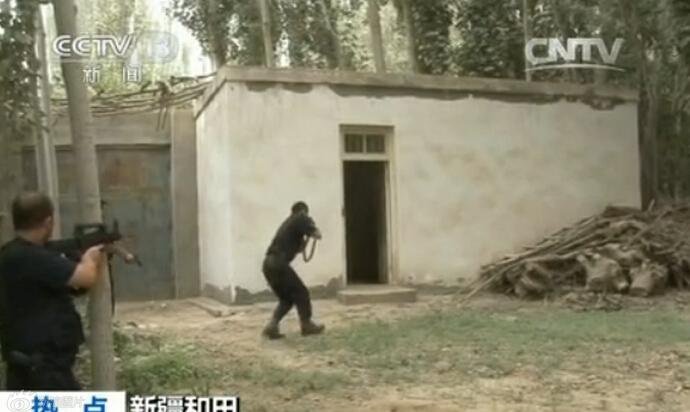Who does terrorism in Xinjiang really target?
- By Jian Ji
 0 Comment(s)
0 Comment(s) Print
Print E-mail China.org.cn, August 4, 2014
E-mail China.org.cn, August 4, 2014
|
|
|
A video grab shows policemen corner fleeing terrorists with the help of local Uygur people in Moyu county of Hotan prefecture in the Xinjiang Uygur autonomous region on August 1, 2014. [CCTV] |
Issues such as these originate from one key question: who, in fact, is the owner of this land?
It is well-known that the area of present-day Xinjiang was referred to as Xiyu (Western Region) in ancient times, since which time people from various ethnic groups have been living here. Chinese central authorities began governing this area during the Western Han Dynasty (202 BC – 9 AD), both farming the land and protecting it. The emperors of the Yuan Dynasty (1206-1370) expanded Chinese territory to extend further into central Asia, and the final Chinese imperial dynasty, the Qing Dynasty (1636-1912), formally established Xinjiang as a Chinese province.
History therefore shows that Xinjiang has been an inseparable part of China since ancient times. Some people with ulterior motives have, however, attempted to distort this history by terming certain ethnic groups "natives" and others "foreigners" – or even "colonists" – based on mere assumptions.
This is no more than an attempt to mislead the public into supporting the separation of Xinjiang from Chinese territory. Unfortunately, some inlanders who are not aware of the relevant history have gone along with the separatists' orchestration, evident in their lack of self-confidence in dealing with disputes that involve ethnic groups.
Appeasement has fostered violent terrorists' arrogance, reducing their respect for the law, even though they are already committing killings and lootings. These violent terrorists fundamentally wish to dominate Xinjiang while exorcizing other ethnic groups in the name of protecting their homeland and "expelling invaders." They carry the banner of Islam only because they seek recognition from their ethnic group. The terrorists do not hesitate to incite ethnic hatred and advocate murder in order to achieve their goal.
The murder of Jume Tahir has brought the extremists' and terrorists' true intentions to light. "Preserving Islam and restoring Islamic rituals" are falsehoods they use to hide their attempts to separate Xinjiang from the homeland along lines of culture, religion, customs, costumes, and diet, among other things.
If we have learned anything from Chinese history, it is that anyone who attempts to achieve his or her own goals at the cost of social stability and financial and personal damage to others will ultimately meet with failure.
People from all ethnic groups in Xinjiang should recognize the true intentions of the Three Evils – "terrorism, separatism and religious extremism" – which promote the slaughter of both innocent civilians and religious leaders. They attack government offices, including those of law enforcement officials. In their crimes against the state and their crimes against humanity, they trample upon the lives and safety of everyone, including those of their own people.
This article was first published in Chinese and translated by Chen Boyuan.
Opinion articles reflect the views of their authors, not necessarily those of China.org.cn.







Go to Forum >>0 Comment(s)